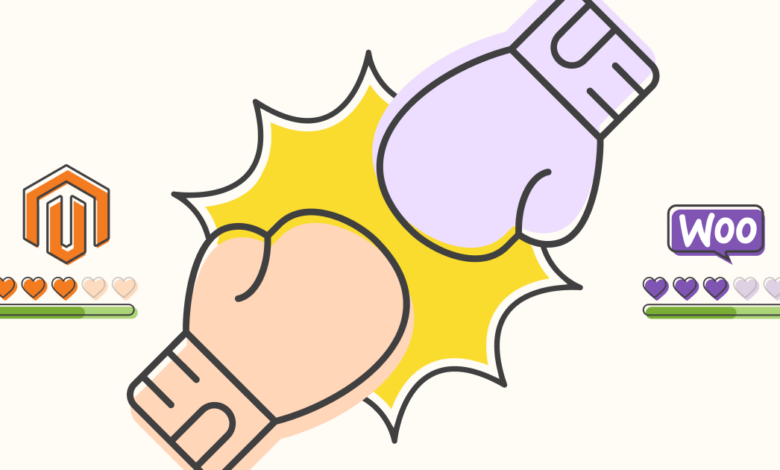Magento vs WooCommerce: who comes out on top?

Finding the right platform for your e-commerce business is not an easy task. There are a lot of things to consider – too many probably. Let’s not waste any more time and get down to business.
Magento and WooCommerce are among the two most popular platforms when it comes to online stores, but they cater to different types of businesses and therefore have different features. In a battle between the two, who will win?
Let’s take a look at the pros and cons of each platform.
Magentothe e-commerce giant
Magento is a standalone platform that requires its own hosting. This means that you must (on your own or through an agency) install the platform yourself and provide your own hosting solution. You (or your partner agency) are responsible for maintaining the store, its security, its updates and its optimization.
Inasmuch as open source platformMagento is particularly suited to this type of hands-on development. Although this requires deeper technical expertise, the platform can be modified and built exactly to your preferences. This also makes it ideal for managing large stores with high traffic and large-scale catalogs.
When it comes to your options regarding Magento, you can choose between Magento Open Source and the Adobe Commerce enterprise version. Although the open source version is free to download and install, you need a partner to help you build and grow your store. The enterprise version has a hefty price tag that comes with its licensing fees, starting in the tens of thousands per year.
However, Magento costs are highly dependent on many factors. It not only depends on the version of Magento you choose, but also your hosting needs, the level of customization you need, as well as subsequent maintenance. The difference between a basic store and a highly customized store can be hundreds of thousands of dollars.
Magento is also in tune with modern technologies, including interactive shopping experiences. It could be seen that it has already introduced virtual and augmented reality (VR/AR), allowing the visualization of products in a 3D environment, which could prove particularly useful in sectors such as home and furniture. You can learn more about AR in the retail space in one of our articles!
Generally speaking, with its advanced features and scalability and customization possibilities, Magento is best suited for medium to large businesses with complex product catalogshigh customization needs, as well as those looking to plan for large-scale growth.
WooCommerceWordPress’s e-commerce cousin
Unlike Magento, WooCommerce is not a standalone platform but a plugin designed for WordPresswhich means you need WordPress as a base. Thanks to this integration, WooCommerce is quite simple to set up and users familiar with WordPress can manage it without significant technical knowledge.
This platform is best suited for small and medium-sized businesses because it is scalable to a certain extent. Although it can handle larger catalogs, it is limited compared to Magento in handling advanced product options and more complex customizations, as its customization is limited to plugins and themes. Additionally, reliance on third-party plugins and themes can increase vulnerability if not managed properly.
WooCommerce is also free to use as a plugin, but there may be additional costs for premium themes, plugins, and hosting. In general, the costs of creating and maintaining a WooCommerce store are lower than those of Magento.
Similar to Magento being best suited to a certain audience, WooCommerce is ideal for small and medium-sized storesespecially those who have a specific low-end budget or need a simple setup.
When to choose Magento over WooCommerce?
Both platforms have their strengths, so your choice will depend on the size of your business, your resources, your objectives and your needs.
Magento is popular among major e-commerce brands, businesses with international sales and operations, and B2B businesses with complex pricing structures. When we look at the statistics of the largest stores on the global Web, Magento is a more common solution than WooCommerceeven though WooCommerce is more widely represented across the entire market.
Magento will be the right choice for you if you value customization and scaling.. Its advanced features can help you maintain a large product catalog and extensive integrations such as ERP and CRM integrations. Keep in mind that you will need a dedicated technical team, either your own or a hired team of developers.
Conclusion
I hope that after reading this article you will have a better idea of which platform meets which needs.
WooCommerce is simpler to use and may be more appealing if you’re a small business looking for something easier to manage, but Magento might be better suited to your needs if you’re a large or growing business with needs more complex.
Which is the best? That’s not the right question. The right question is: which platform suits my needs?



